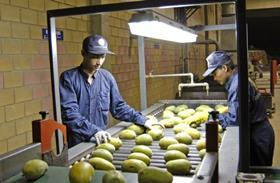
Pakistani fruit exporters have staged a demonstration in Taftan, the main border crossing with Iran, to protest the rejection of unrefrigerated shipments by Iranian customs authorities.
Exporters have suffered losses in the millions of rupees (tens of thousands of US dollars), according to Pakistan Press International (PPI), as shipments of fruit perish waiting in Taftan’s Customs House.
The conflict stems from a 2009 protocol agreed on between the two countries stipulating certain categories of Pakistani produce could only enter Iran after cold treatment in refrigerated containers, in particular to guard against fruit fly.
The protocol includes kinnow mandarins; Iran is Pakistan’s largest export market for the fruit, and the season is currently in full swing.
Pakistan’s exporters have complained of a shortage of refrigerated containers, and called on Iranian authorities to scrap the protocol. They warned of further protests if their demands were not met, the PPI report said.
Problems arising from Iran’s efforts to tighten controls on cross-border fresh produce trade with Pakistan were predicted as far back as mid-2009 when moves began.
“Iranian quarantine authorities are likely to stop kinnow imports from Pakistan for violation of the agreed protocol and it will be a great loss to growers and the country,” Pakistan’s ambassador in Tehran told the Pakistan commerce ministry and the Pakistan Horticulture Development and Export Board (PHDEB) in a letter written in July last year.
“Shipping companies are not providing refrigerated containers to the exporters who opt to export the fruit through the Bhalwal-Quetta-Taftan route,” the letter said, reported Pakistan’s The News.
“About 20 processing units can issue certificates verifying that the kinnow consignment has been subjected to 14 to 16 days of cold treatment, but reportedly most of the exporters utilising the land route are getting fake certificates.”
Around 65 per cent of Pakistan’s officially-logged kinnow exports to Iran enter via the Taftan crossing, but the percentage of total exports crossing by land is likely to be higher as a result of unrecorded trade, according to PHDEB CEO Shamoon Sadiq.
“There is a lot going through the borders unofficially. Recording trade to Iran is difficult,” Mr Sadiq told Fruitnet.com in October last year.
“Officially kinnow exports to Iran were 40,000 tonnes `in 2008/09`, but I can imagine there was another 20,000 tonnes in reality.”



